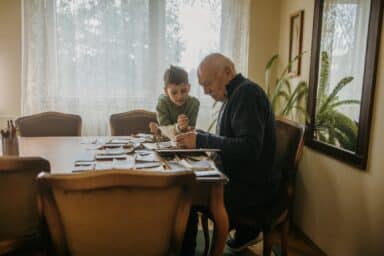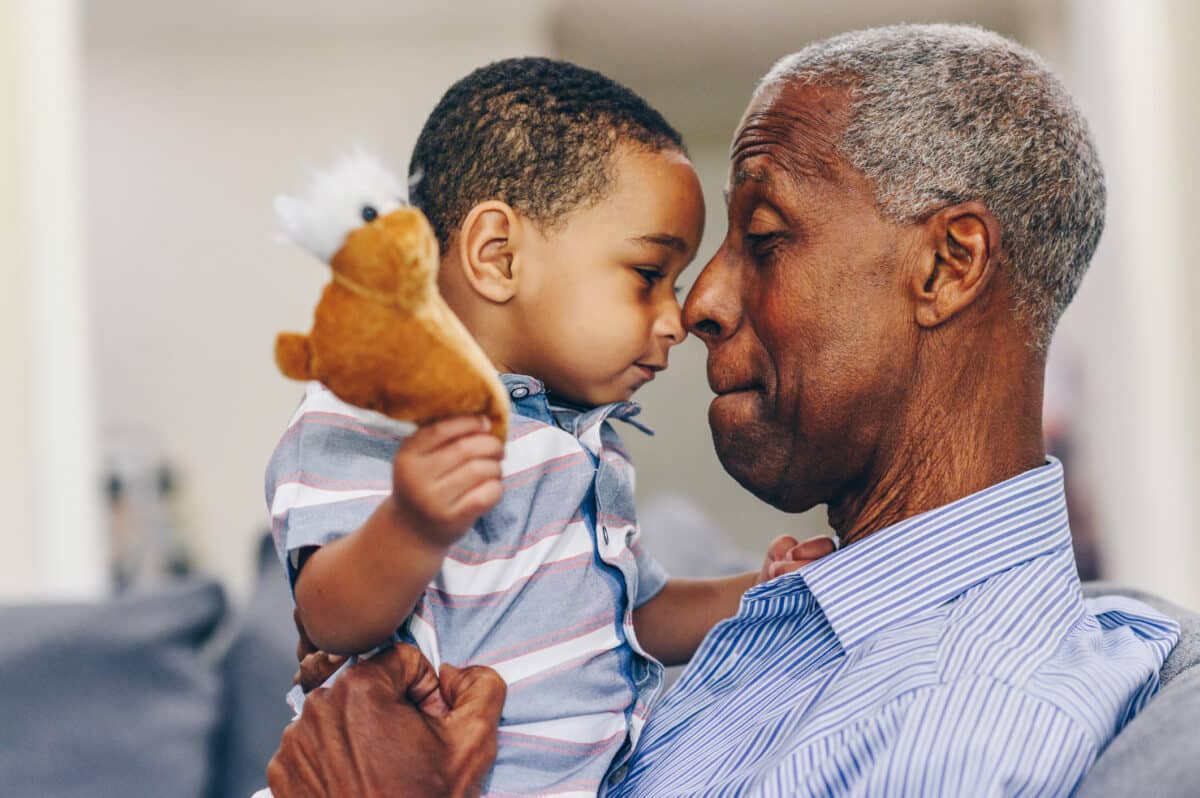

Grandparenting comes with all sorts of benefits for both you and your grandchildren. Discover the advantages of connecting with younger generations and how to build healthy, rewarding relationships with your grandkids.

As a grandparent, you can play many important roles in your grandchildren’s lives. One survey of American families found that most grandparents fix meals and provide financial support to their grandchildren. However, grandparenting can go far beyond these material contributions. From words of wisdom to play to emotional support, as a grandparent you have lots to offer the younger generations in your family.
It all starts with fostering a healthy relationship with your grandchildren, by dedicating time and effort to better connect with your family. This could mean visiting your grandchildren more often, planning trips together, or simply making weekly calls or texts, or writing the occasional card or letter. As you’ll start to see, the results are well worth the effort.
In no particular order, grandparenting is an opportunity to play, to love someone new, to appreciate the magic of a developing mind, and to be needed by someone again. Grandparents can:
Usually, grandparents have the benefit of interacting on a level that is once removed from the day-to-day responsibilities of parents. This can make it easier to develop a close bond with grandchildren. From near or far, grandparenting can provide continuity in a child’s life. Grandparents are often family historians and can add a rich sense of family tradition to a child’s life.
Additionally, contact with grandparents can teach children positive attitudes toward aging and help them develop skills to enhance their own lifelong learning. A child’s sense of security and well-being is also boosted by positive interactions with their elders. One study from the University of Oxford found that when grandparents are more engaged with grandchildren, those children have fewer behavioral and emotional issues. Other research has shown that close ties with grandparents can improve a grandchild’s emotional resilience.
Of course, not everything about being a grandparent is great all of the time. Becoming a grandparent at a young age can make some people feel prematurely old and, just as parents do, grandparents sometimes have to deal with colicky babies and moody teenagers. For most though, the benefits of being a grandparent far outweigh the drawbacks. Being involved in your grandchildren’s lives can be emotionally gratifying by making you feel useful to your family and fostering a stronger sense of belonging. Some research even suggests that noncustodial grandparenting—that is, playing a supportive role in caregiving but not having to raise your grandchildren—can help you live a longer life.
Grandparents can play many different roles, depending on the family configuration and needs. Some grandparenting requires a full-time commitment. For others, grandparenting is a weekend together, an afternoon play date, a summer vacation, a chat on the phone, or a text or email exchange every now and then.
A good first step to a long and successful relationship with your grandchild is to establish some ground rules with their parents:
Whatever your specific circumstances, when you are expressing love, showing concern for your grandchild’s safety and well-being, and being consistent in your behavior, you are probably already doing an excellent job of grandparenting.
To avoid potential conflict within your family, try to avoid these common grandparenting pitfalls:
BetterHelp is an online therapy service that matches you to licensed, accredited therapists who can help with depression, anxiety, relationships, and more. Take the assessment and get matched with a therapist in as little as 48 hours.
Take Assessment HelpGuide is user supported. We earn a commission if you sign up for BetterHelp’s services after clicking through from this site. Learn moreThe best grandparenting activities flow naturally from the interests of both the grandparents and the grandchildren. You can create a deep, loving relationship with your grandchildren by sharing the things you love with them and by being available to hear about the ideas and activities that excite them.
Take it easy together. Make an effort to enjoy leisure time with your grandchildren. As a grandparent, you get to interact with your grandchildren without the same daily pressures of a parent—you don’t have to worry about driving carpool or juggling making dinner for the family with soccer practice and grocery shopping. Allow yourself to slow down and become really absorbed in an activity. Moving at a slower pace than usual can give children a sense that time can be ‘stretched’—that you don’t need to hurry through activities. And, as with adults, it gives them the space to feel, reflect, and express emotions without feeling rushed.
Get outside. Children love the outdoors, and trips to the park or the beach can be a great jumping off point for some wonderful adventures and happy memories. Nature walks and day hikes can provide lots of interesting things to talk about, and water activities can be especially fun. Throwing stones into the water or watching the current play with sticks are simple activities that can be fascinating to children. You can start these activities when kids are toddlers and expand the games as they get older.
Share your interests or your work. Engaging in hobbies and activities that you love or your grandchild loves can be a great way to spend time together and learn about each other. Sometimes, activities that you might not expect your grandchildren to be interested in, such as knitting or gardening, can turn out to provide an important point of connection. Similarly, if you take an interest in something they are passionate about, such as video games or the Harry Potter books, they get to share their special area of knowledge and may open up in new ways.
If you are still working, a visit to your place of work can add a dimension to your grandchild’s perception of you. If you are retired, pictures and stories about what your working days were like can do the same.
Taking a trip with your grandchildren or sharing your love of a favorite place will help you create special memories together. Trips, whether it’s a day trip to a national park, a weekend in a nearby city, or a week-long resort vacation, will always be remembered by the child as special journeys with grandma or grandpa.
One of the great advantages of traveling with your grandchild is the opportunity for both of you to be away from home. Being on the road can mean being free of chores, errands, work—any familiar routine. It means all kinds of possibilities for the unexpected—even on the best-planned trip. All the chances to read train and bus schedules, ride a ferry, stay in a motel or B&B, eat out, or have lots of picnics, offer opportunities to discover new parts of the world, yourself, and your grandchildren.
Involve your grandchildren in planning the trip, and of course, involve their parents to be sure they’re comfortable with the plans. Then hit the road! After you’ve traveled, a scrapbook of that experience can be an ongoing delight for everyone in the family.
It’s estimated that about 50 percent of grandparents live more than 200 miles from their grandchildren. Children’s lives can change very quickly, so long-distance grandparents sometimes struggle trying to keep up with the day-to-day details of their grandkids’ lives. Often, it just requires special efforts to communicate with your grandchild. Those efforts will help establish the foundation for a strong long-term relationship.
When your grandchild is a baby, toddler, or very young child, engage the parents to keep up to date on your grandchild’s progress, their current interests, and the type of reading or viewing material that might be appropriate. When the child is old enough to interact, whether on the phone, FaceTime, or regular mail, start engaging the child directly.
Technology can add a whole new dimension to long-distance grandparenting. Texting, messaging, social media, email, and video conferencing can all help to shrink the miles and keep you in touch with your grandchildren. Use the available technology to engage your grandchild in creative activities rather than simply asking, “How’s school?” For example, you can play online games with your grandchild, start an online book club or fantasy sports league with them, or share videos of enjoying a favorite hobby. Try exchanging jokes or favorite family recipes, or have them share report cards or photos of pictures they’ve drawn.
As well as the Internet, there are plenty of other ways to help long-distance grandparenting:
All of these small things communicate your interest and love. Whenever possible, though, try to be present for the most important events in your grandchild’s life, such as graduations, recitals, holidays, or whatever events are important to your family.
Divorce, death of parents, or a parent’s work or school-related responsibilities are just a few of the reasons some grandparents assume full- or part-time responsibility for their grandchildren. Often known as “kinship care,” a growing number of grandparents are taking on the parenting role of their grandchildren, thus foregoing the traditional grandparent/grandchild relationship.
Grandparents who assume the role of parents often find themselves giving up leisure time, the option of traveling, and many other aspects of their independence. Instead, they take on responsibility for the day-to-day maintenance of a home, schedules, meals, homework, and play dates. In cases where tragedy requires a grandparent to step into the role of parent, there are also many additional stress factors—grieving on the part of the children and the grandparents, for example—that need to be addressed.
While it can be more stressful than playing a part-time role in your grandchildren’s lives, raising your grandchildren can also be incredibly rewarding. Grandparents in this position experience much greater connection to their grandkid’s world, including school and leisure activities. They often find themselves rolling back the years, rejuvenated by the constant companionship of much younger people. They also derive immense satisfaction providing their grandchildren with a safe, nurturing, and structured home environment in which to grow and feel loved.
[Read: Grandparents Raising Grandchildren]
Some circumstances make it necessary for grandparents to seek legal help. If there’s been a divorce, death of one parent, estrangement, or the suspicion that your grandchildren are being neglected or abused, you may want to consult a lawyer or advocacy group to ensure access to your grandchildren.
Two issues arise with regard to grandparenting: custody and visitation. In either event, the goal is to maintain the children’s connection to a family beyond the nuclear family. Read: Legal and Custody Help for Grandparents Raising Grandkids.
Have you married another grandparent? Have your kids become stepparents? Step-grandparenting has grown as a family phenomenon because of the growing number of blended families.
As with all aspects of blended families, step-grandparenting can present awkward moments, and create complex relationships—especially if there are already other grandparents in the picture. Children might feel the need to be loyal to the original grandparents and conflicted about giving and receiving affection in the new relationship. With patience, understanding, and open communication, though, a step-grandparent can become an important part of a blended family, and a new friend for a child to love.
[Read: Guide to Step-parenting and Blended Families]
Whether you’re a full-time grandparent, a step-grandparent, or a long-distance grandparent living thousands of miles away, you can strengthen family ties and provide your grandchildren with joyful memories and valuable life lessons. And, in doing so, you may also cultivate a greater sense of purpose and even learn a few new things yourself.
Last updated or reviewed on August 21, 2024Millions of readers rely on HelpGuide.org for free, evidence-based resources to understand and navigate mental health challenges. Please donate today to help us save, support, and change lives.
Donate to HelpGuide.org today